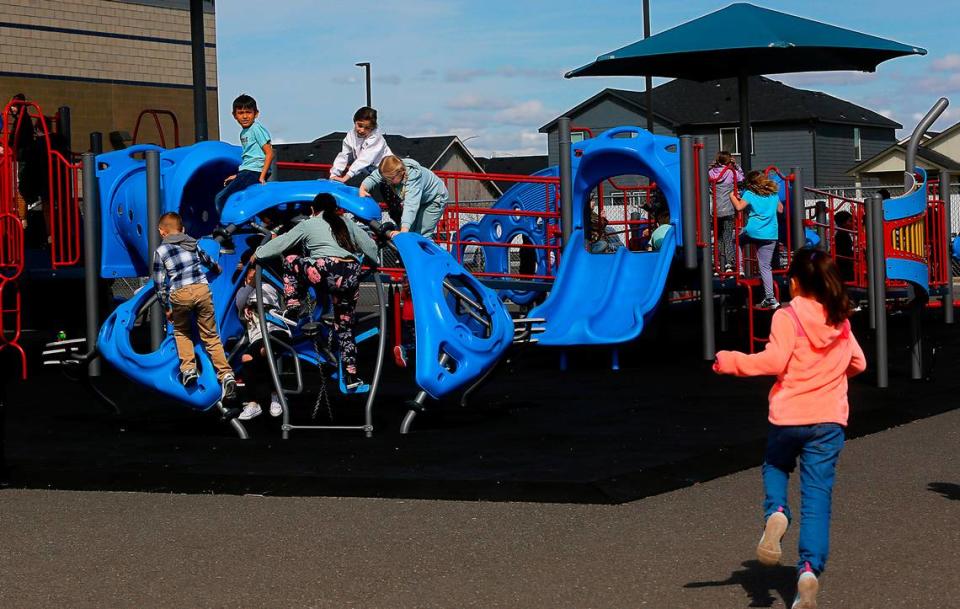Pasco elementary school recognized among top 10 most inclusive playgrounds in the country
After nearly four years in operation, a local playground is receiving national attention for its inclusive design.
The Three Rivers Elementary School playground was recognized as the ninth best inclusive school playground in the country, according to a study by Soliant, a national healthcare staffing company.
It was outranked by schools in Missouri in first place, followed by Michigan, Illinois, Texas, Massachusetts, New York, California and Georgia at eighth. It’s followed by a school in Wisconsin.
Soliant conducted the study for Developmental Disabilities Awareness Month, assessing school playgrounds by the quality and quantity of features, the use of inclusive design principles and the inspirational stories behind its development, funding or naming.

Three Rivers’ playground was designed to address physical and social inclusion of all people, according to the Pasco School District.
Much of the structure is multipurpose, so kids can play alongside each other while doing completely different activities, whichever suits them best.
Inclusive playgrounds in WA state
When Three Rivers opened in 2019, it was the only inclusive school playground in the state. This was recognized by PlayCore, a playground equipment company focused on research and community advancement.
PlayCore’s National Demonstration Site Map tracks inclusive play spaces across the United States. It currently shows that the Three Rivers Elementary playground is still the only school in Washington with an inclusive playground.
However, Tracy Wilson, Pasco’s executive director of special education, says Columbia River Elementary School in Pasco also has an inclusive playground. While it hasn’t been added to the map yet, she hopes this will be soon.
According to PlayCore’s map, the only other inclusive playgrounds in the state are city parks, the recently-updated Prosser City Park and a park in Lynnwood. Beyond that, the closest options are in Oregon.

The entire structure was designed with inclusive principles in mind, leaving the playground open for all students. This way, regardless of the stimulus they respond to, all students can have fun and beneficial playtime.
There are options for all kinds of students with a range of abilities, according to Wilson.
The structure is tiered and has five different climbing options, but there’s also a ramp for students who can’t climb.
Why playground options matter
By offering a variety of options, the playground can serve the most students. Standalone features around the main structure, like a spin seat, add opportunities for kids to choose exactly how they want to spend their playtime.
“It allows kids a variety,” Wilson said. “Because if you can’t imagine or do these things differently, then the kids get bored with the playground. So they really designed this to be ongoing, interactive and creative.”
There are also wide walkways on the playground, in case a student has medical needs or requires a nurse’s aide. Kids with walkers or wheelchairs can enjoy the structure just as much as other students.
Bacon says students have learned to cooperate and communicate better because of the free-range nature of the playground.
Many of the traditional playground rules have been eradicated. According to Bacon, there are few rules at all. Playing tag is one of the only activities not allowed on the structure.
Students seen playing tag will be asked to move to the grass. The intuitive nature of the design has allowed proposed rules to be reactionary, so school administrators can adapt to student behaviors.

“You don’t have to do everything the same way,” said Wilson. “The equipment doesn’t tell you how to play, the kids determine how they want to play with this.”
Connecting playgrounds and values
When a bond was passed for additional Pasco elementary schools, the district evaluated what it wanted to promote, support and encourage. Two of the chosen values were inclusivity and belonging, according to Wilson.
With these values in mind, Pasco school officials began the proposal process, specifically asking vendors to design inclusive playgrounds. Research from the Center for Universal Design suggests seven principles of inclusive design.
The design should be fair, inclusive, smart, independent, safe, active and comfortable. Vendors were required to implement these principles in their design, according to Wilson. There were several submissions from around the country.
Since opening, both Bacon and Wilson have noted a change in students’ playtime and how students interact with each other. They say there is also more camaraderie between the special education students and the general education kids.


